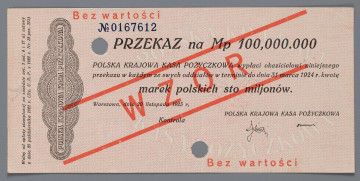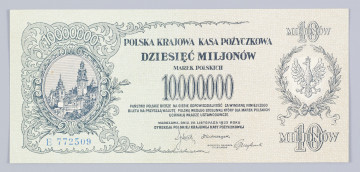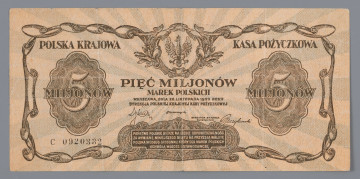
Cheque for 100,000,000 Polish marks - a template
1923
National Museum in Lublin
Part of the collection: Paper money during the Second Polish Republic
The 500,000 Polish mark (mkp) banknote is one of the highest denominations of the 1923 hyperinflation period in the Republic of Poland. It was caused by the deteriorating economic situation of the Polish state, whose budget revenues did not cover its expenses. The collapse of the mkp was influenced by the collapse of the German mark, with which the Polish currency was linked. The budget deficit, which had been growing in Poland since 1919, was supplemented by the printing of money, which was not covered by gold and was not reflected in the increase in goods on the market. This forced the introduction into circulation of successively higher denominations. Thus, in the summer of 1923, along with the 500,000 mkp banknote, 100,000 and 1,000,000 mkp denominations were introduced.
This banknote was designed by unknown artists from the State Graphic Works in Warsaw. It was printed in the above-mentioned printing house and in the Printing House of the Publishing Institute “Biblioteka Polska” in Bydgoszcz, as well as in other private printing houses in Warsaw, using the typographic technique on smooth white paper. We know it in many letter series, marked with six or seven-digit numbering. These banknotes vary in size: smaller ones 68 x 143.5 mm and larger ones in the range of 81 x 157 mm - like our copy.
500 000 mkp served as a means of payment from 8 October 1923 to 1 July 1924, when the mkp was replaced by the Polish zloty. Nevertheless, the withdrawal of the mark currency did not end its usefulness. Interestingly, some of the printed copies of certain series, after cutting them in half and applying an appropriate print, became one-grosz treasury notes of the Ministry of Treasury of the Republic of Poland in the zloty currency, which were in use from 28 April to 1 November 1924. A total of 49,171,000 copies of the 500,000 mkp were reprinted as treasury notes at the State Graphic Works in Warsaw.
When the 500,000 mkp banknote was introduced (October 8), its value corresponded to the cost of a two-and-a-half-month subscription of “Kurier Warszawski”. A month later it was worth only half its original value. In November 1923, bread cost 55,000, a kilogram of sugar 250,000, and a litre of milk 40,000 mkp.
Tomasz Markiewicz
Author / creator
Dimensions
cały obiekt: height: 155 mm, width: 80 mm
Object type
paper money
Technique
Material
paper
Creation time / dating
Creation / finding place
Owner
The National Museum in Lublin
Identification number
Location / status

1923
National Museum in Lublin

1923
National Museum in Lublin

1923
National Museum in Lublin
DISCOVER this TOPIC
National Museum in Lublin
DISCOVER this PATH
Educational path